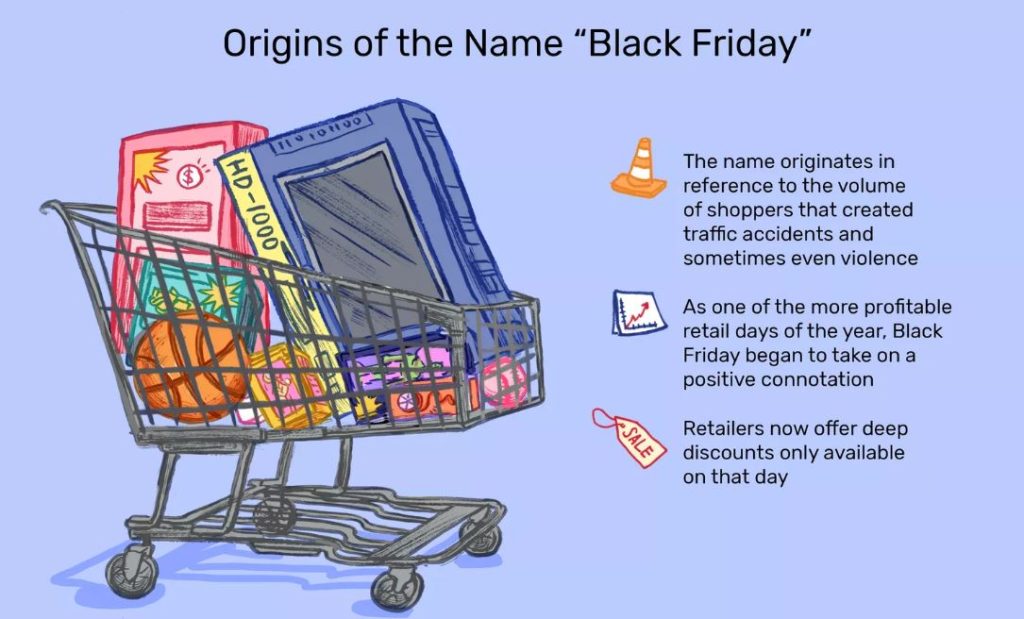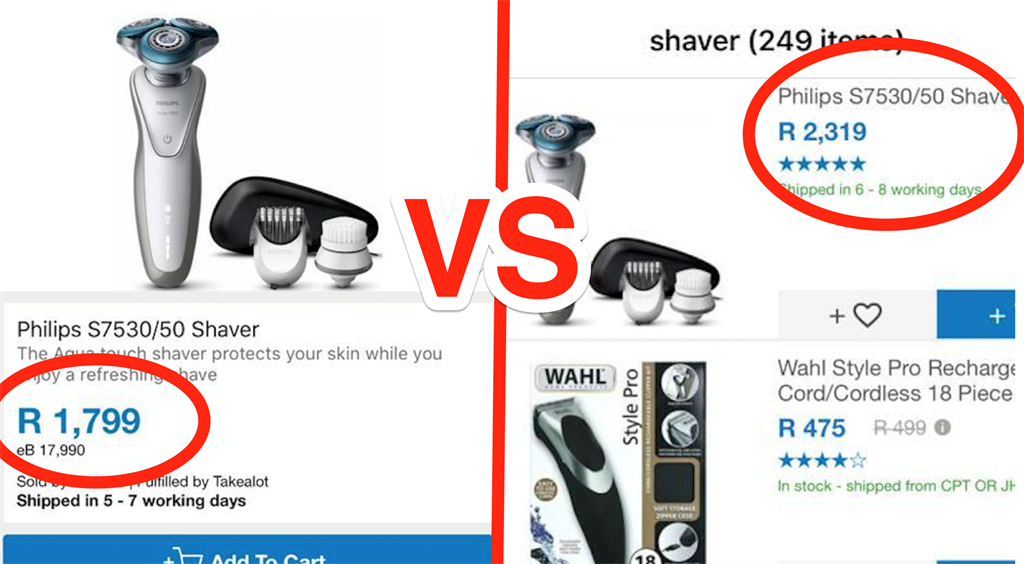Black Friday is the last Friday of November, originating the United States as the day after Thanksgiving as a way to kick off the holiday season, many countries including South Africa has since adopted this holiday since the 2000’s and growing in popularity every year. During this annual shopping holiday, retailers typically offer steep discounts to kick off the holiday season
When is Black Friday this year 2022?
Black Friday is on the 25th November 2022 this year
The last Friday of November—commonly referred to as Black Friday—has become one of the busiest shopping days of the year. National chain stores traditionally offer limited money-saving specials on a wide variety of goods in an effort to lure shoppers into stores while offering similar deals online.

Black Friday scams to look out for in South Africa… How do I avoid the Black Friday scams this year?
Black Friday normally promises some great specials for South African shoppers every year, this Black Friday 25 November 2022, scammers have some specials of their own in store for some unlucky bargain shoppers!
Reports tell us that this year, more South Africans will swap busy shopping centre lines for the checkout button on their go-to e-commerce sites as Black Friday goes more online than ever! One of the long term effects of COVID… increased online shoppers and more trusting online buyers.
“This is why staying vigilant, and knowing how to spot dodgy deals and scams, has never been more important,” said ESET Southern Africa CEO Carey van Vlaanderen.
Even your beloved big box online stores got caught price gauging last Black Friday like TakeAlot.

Unhappy shoppers flocked to their social media on Friday to complain that discounts offered were “not actually” discounts.
Over the past few years, retailers such as Takealot and Clicks have been hyped as the ultimate Black Friday celebrators. However, both faced backlash for allegedly inflating prices or offering no real discounts.
Takealot defended its pricing, telling TimesLIVE that in some cases there are two different sellers for the same product on the site. The company says it is possible that one seller is not part of the Blue Dot Sale.
In some cases there is limited stock of an item. Once the Blue Dot Sale stock is sold out the item reverts to its original price… true or not, you decide,
“Unfortunately, this sometimes happens while a shopper is in the process of checking out, which seems to have been the case in this instance. Deals are available on a first come, first served basis and stock is only reserved once payment is received,” it responded to one complaint.
Clicks also defended its pricing, saying: “Pricing labels are updated when sales launch in-store. These price tags have been adjusted for the ‘Why Wait For Black Friday’ promotion.”
But we still ask the question: Why are some prices even higher than the original prices on a normal day?
This is why every day is Black Friday on the FOMO app as we only promote specials daily:
See FOMO Deals here
-
 -50%
-50%Wild X | Quad bike dune adventure for 1
Atlantis, Cape TownOriginal price was: R995.R499Current price is: R499. -
 -40%
-40%Wild X | Quad bike dune adventure for 2
Atlantis Dunes, Cape TownOriginal price was: R1,990.R1,199Current price is: R1,199. -
 -79%
-79%Iris Blissful Day Spa | A Calming Spa Package for 2 Incl a Facial
Sandton, JohannesburgOriginal price was: R2,800.R599Current price is: R599. -
 -22%
-22%Rush Extreme Sports Cpt | Full Access To The Ultimate Indoor Extreme Park for 2
Claremont, Cape TownOriginal price was: R320.R250Current price is: R250. -
 -61%
-61%Reflections | A Luxury Couples Spa Package at Reflections Day Spa for 2
CBD Cape TownOriginal price was: R1,900.R749Current price is: R749. -
 -38%
-38%K Beauty Spa | Luxury Full Body Massage for 2 + Sauna Room access
V&A Waterfront, Cape TownOriginal price was: R1,600.R990Current price is: R990. -
 -22%
-22%La Vita Spa | A Couple Treats 2.5 hour package + meals and drinks for 2 people
Sea Point, Cape TownOriginal price was: R1,920.R1,499Current price is: R1,499. -
 -22%
-22%Waterfront Charters | Champagne Cruise (Pre Sunset) for 2
Waterfront, Cape TownOriginal price was: R900.R699Current price is: R699.

According to van Vlaanderen, these are the most popular scams of 2022 and ones shoppers should look out for during Black Friday:
**Original content from Business Insider
- Phishing emails
Phishing emails are one of the oldest tricks in the cyber book because they often work! Especially on Black Friday when consumers receive many emails from retailers about upcoming specials, order confirmations, and delivery information.
Fake order confirmation emails surge at this time of year. These emails claim that one of your orders has been confirmed but won’t mention the content of your purchase. Instead, they tell you to click on a malicious link to find out. DON’T CLICK ON THE LINK!
An increasingly common phishing scam is the “there is a problem with your order” email scam, warns van Vlaanderen. These are cleverly mimicked messages from courier companies to direct you to a link asking you to click on the link, such as paying for a delivery fee shortfall or entering personal information.
2. WhatsApp Black Friday voucher scams and competitions
Fake vouchers and fake competitions are other forms of ‘click the link’ scams that go viral on WhatsApp during Black Friday.
These messages include promises of free shopping vouchers or too good to be true competitions with the chance to win big-ticket items that look convincing and direct users to click on a URL that looks like a legitimate retailer – this is to convinvce people to share confidential information.
3. Social media scams
Fraudsters are savvy when it comes to social media all year round, but Black Friday is an opportunity to take advantage of the increased number of online shoppers and blend in with the great looking bargains popping up on news feeds across the country.
Van Vlaanderen suggested shoppers exercise much needed extra caution around ads offering deals on designer items and massive discounts on luxury goods!
“Always check the seller’s website and their reviews before you purchase, and stay clear if you land on a site with an unusual domain,” she said. Always make sure there is a little “lock” in the URL bar where the websites web address is!
4. Tickets to nowhere
As the year winds down, many people are exhausted and look forward to well-deserved rest and relaxation. With so many great occasions to socialise with friends and family, from concerts and festivals to sporting events and craft markets, it’s not surprising fraudsters push ticket scams on Black Friday.
Van Vlaanderen warned that criminals usually target sold-out events, offering fake tickets to highly sought-after sporting matches and concerts for the summer time. Scammers will use fake pictures of tickets to fool fans or publish a made-up story about why they cannot attend to sound more legitimate.
She added that once the cash is sent, the scammers simply disappear, leaving behind an anonymous, untraceable online identity and an angry fan.
How to stay safe this Black Friday:
- Ensure your security is up to date – Cybersecurity solutions is important, like antivirus, firewalls and internet protection must be installed on any connected device, especially your mobile phone(this is more important than you may think), when you’re more likely to connect to wi-fi, use banking apps, and make online payments.
- If it sounds too good to be true, it most likely is!
- Only shop on websites you know and trust – Always type out the correct website address in your browser rather than clicking on a link.
- Stay away from public Wi-Fi – Criminals often intercept public wi-fi by creating a fake hotspot in the same area as a genuine hotspot.
- Only use secure payment services like PayFast– and never share your OTP or passwords with anyone…ever.
Key Takeaways
- Black Friday is not an official holiday but falls on the last Friday of November. Some people spend the day finding discounts from retailers to kick off the holiday shopping season.
- It’s a critical day for the retail sector, as the holiday season can account for 20% or more of annual sales for many retailers.
- Other financial “holidays” have also sprung up around this time, including Small Business Saturday, Cyber Monday, and Giving Tuesday.
How Does Black Friday Work?
Black Friday is part of the holiday shopping season. Having a profitable Black Friday is essential for many retailers, especially toy and game stores. From 2017 to 2021, the holiday season amounted to about 19% of annual sales for many retailers.
Many retailers open late the Thursday before Black Friday or early Friday morning. Some shoppers wait in line to get the best deals and shopping continues throughout the weekend.
Note
The best Black Friday deals are, surprisingly, not on Black Friday. Many retailers, including Amazon and Takelot, offer sales earlier and earlier, upstaging Black Friday itself. The competition has gotten so fierce that stores have innovated new ways to get your dollar, sometimes starting much earlier in the year.

Examples of Black Friday
Spending on Black Friday is likely to be high again this year, despite inflation. They predict all holiday spending will be up 6% to 8% over last year.
Note
46% of holiday shoppers had started shopping before November, with a majority of those saying they started early to spread out their spending.5
Why Is It Called Black Friday?
Black Friday is an informal name used to describe the last Friday of November. It’s often the busiest shopping day of the year because it kicks off the holiday season. This day can be crucial for the economy, especially for certain retailers.
The term “Black Friday” has its roots in the middle of the 20th century. Police in Philadelphia initially used the term “Black Friday” to refer to heavy, disruptive traffic on the day after Thanksgiving.6
The term spread and businesses latched onto it. It worked well for retail businesses that depended on holiday shopping to put their finances “in the black” (earning profit) rather than “in the red” (operating at a loss).
Historical Black Friday Spending Data
We gathered nearly 20 years of holiday sales data from the NRF and found that the average annual increase in Black Friday spending has been 3.5%. Before the 2008 financial crisis, the average annual increase was 4.8%.7
Black Friday vs. Cyber Monday
The Monday following the weekend after Black Friday is known as “Cyber Monday,” when many people buy gifts online, and it has become a shopping event in itself. It’s typically the biggest online shopping day of the year, and in some years it has surpassed Black Friday in terms of total sales.
Black Friday
- Refers to the last Friday of November
- Focused on sales in brick-and-mortar stores and online
- Busiest holiday shopping day of the year in total shoppers
Cyber Monday
- Refers to the Monday following Black Friday
- Focused on online sales
- Shoppers spend more money than they do on Black Friday
Note
While Cyber Monday may be known for its online shopping, Black Friday has its fair share of digital purchases as well. About 88 million shoppers reported ordering online during Black Friday in 2021.3 In 2020, more than 100 million shopped online on Black Friday, up from 93.2 million people in 2019.1011
Although shoppers will never completely abandon brick-and-mortar stores, they expect retailers to offer a convenient online alternative. Many retailers are seeing sales boosts by allowing consumers to buy online and pick up in-store.
Other money-related holidays have sprung up around this time as well. Small Business Saturday is the day after Black Friday and is an effort to focus spending on local mom-and-pop shops. The day following Cyber Monday has been deemed Giving Tuesday and was created to fuel charitable giving during the holiday season.
Frequently Asked Questions (FAQs)
When is Black Friday?
Black Friday always occurs the last Friday day of November but the exact date changes from year to year. In 2022, Black Friday falls on November 25. The shopping holiday occurs on November 24 in 2023, November 29 in 2024, and November 28 in 2025.
Is Black Friday considered a holiday?
Black Friday is not considered an official holiday. Some companies offer the last Friday of November off, but it is not a federally recognized holiday.

